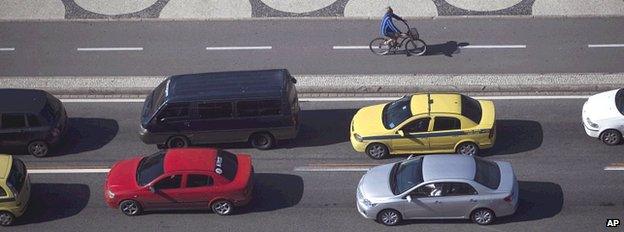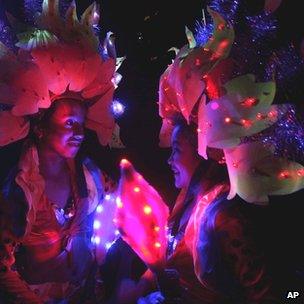Europe struggles for climate lead
- Published

Climate ministers are making little headway against powerful forces
UN climate talks have opened in Germany, with the EU struggling to keep its position of a global leader.
Small developing countries that linked up with the EU in a new coalition last year say the bloc must commit to tougher emission cuts and more finance.
Existing pledges on "climate aid" run out at the end of this year, and the EU has yet to clarify what happens then.
Most EU nations want to increase carbon cuts but they have not worked out how to negotiate around Poland's blocking.
Attempts to toughen the EU's target from 20% to 30% below 1990 levels by 2020 have stumbled on Polish government fears about its economic impact on the major coal-producing and coal-burning nation.
Last December's annual UN climate summit, in South Africa, saw the EU team up alongside at least 80 nations, primarily small island states and Least Developed Countries (LDCs), in a new "rainbow coalition" pressing for a new global deal that would eventually restrict all nations' emissions.
At a small informal meeting in Brussels last week, just over 30 nations from the coalition took stock of the situation, with members of the Alliance of Small Island States (Aosis) urging the EU to adopt the 30% target as soon as possible.
"There was agreement that it's got to go up to 30%," Tony de Brum, Minister in Assistance of the Marshall Islands, told BBC News.
"We don't want to be intrusive or over-reaching, but we said 'we don't think the disagreement in your group is so overwhelming - when 26 say yes and one says no, we think you could probably bring along the dissident, so please don't come to us with this kind of excuse'."
However, EU Climate Commissioner Connie Hedegaard said moving to a 30% target this year would be "very, very challenging".
Some from Aosis and the LDCs are wondering why the EU cannot simply find a way of moving forward on climate change without one of its member states, given that it recently agreed a new fiscal compact that excludes two.
Flight path
Meanwhile, the Ecofin group of EU finance ministers is also meeting this week to discuss financial contributions for developing countries.

Earth Day recently saw a global dip in energy use - but only for a moment
The EU has pledged - and according to its own analysis, largely committed - 7.2bn euros ($9.3bn) over the period 2010-12 as its share of the "fast-start finance" package agreed at the UN summit in Copenhagen in 2009.
The expectation had been that the developed world, including the EU, would begin to ramp up contributions from public and private sources in order to meet the long-term target, also agreed at Copenhagen, of providing $100bn per year by 2020.
However, a leaked draft of the Ecofin agreement seen by BBC News shows that EU ministers have not agreed what they will provide in the way of finance after 2012, nor how they will provide it.
The draft talks in terms of developed nations "needing to identify" a pathway to the $100bn target. Some money could be raised through the recently introduced charge on aviation emissions, but this is not certain.
"At a critical moment in the fight against climate change, Europe looks to be sitting back rather than stepping up," said Lies Craeynest of Oxfam.
"To build a partnership for climate action with poor countries, the EU must finally move to its promised 30% emissions reductions target, and outline new milestones for scaling up its climate finance."
Slow train?
The coming two weeks of talks at UN climate convention (UNFCCC) headquarters in Bonn - an annual event - will see negotiators beginning work on the pathway towards agreeing a new global deal in 2015, known as the Durban Platform.
Discussions will also focus on developed countries' commitments to cut emissions under the Kyoto Protocol, whose current targets expire at the end of this year.
In December, the EU promised to put its existing 20% target under the protocol - a key demand of developing countries that appreciate its legal nature.
Among other developed countries, Japan and Russia have indicated they will not take the Kyoto path, while Canada said it would leave the protocol at the end of the year. The US left about a decade ago.
That means that the EU and its coalition partners are keen to bring remaining developed countries into the fold.
Along with the EU, Norway, Switzerland, Australia and New Zealand have submitted plans to the UNFCCC detailing how they might turn their existing unilateral voluntary commitments into the legal form required by the Kyoto Protocol.
But the language of the Australian and New Zealand submissions suggests they have not formally decided to take this step, with New Zealand especially linking its decision to progress on the Durban Platform.
However, a number of major developing countries including China and India are lukewarm about the new process.
And with China and the US seeking changes of leadership over the next 12 months, many observers are not expecting much progress to be made either in Bonn or at the annual end-of-year UN climate summit, to be hosted by Qatar.
Follow Richard <link> <caption>on Twitter</caption> <url href="http://twitter.com/#!/BBCRBlack" platform="highweb"/> </link>
- Published6 May 2012
- Published25 March 2012
- Published5 March 2012
- Published7 November 2011